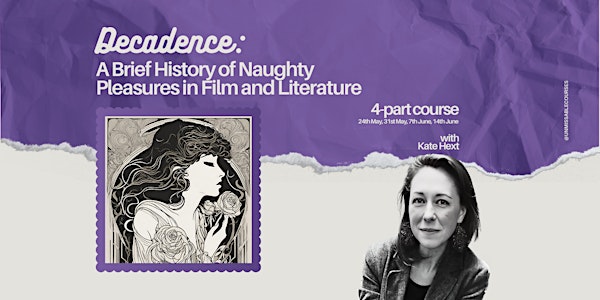
Decadence: A Brief History of Naughty Pleasures in Film and Literature
Explore the allure of decadence in literature and film, from Wilde to Lanthimos, in a journey of pleasure, scandal, and rebellion.
Date and time
Location
Online
Refund Policy
Agenda
3:00 PM - 4:30 PM
Part 1 - 24th May

Kate Hext
3:00 PM - 4:30 PM
Part 2 - 31st May

Kate Hext
3:00 PM - 4:30 PM
Part 3 - 7th June

Kate Hext
3:00 PM - 4:30 PM
Part 4 - 14th June

Kate Hext
About this event
- 1 hour 30 minutes
Decadence: A Brief History of Naughty Pleasures in Film and Literature
‘Nothing succeeds like excess,’ Oscar Wilde wrote in An Ideal Husband – and he should know. Excessive decadent sensations and forbidden thrills abound in modern fiction and cinema. It all began in the late-nineteenth century when Wilde, Walter Pater, Aubrey Beardsley, and the so-called ‘decadent movement in literature’ kicked up a storm. As their works put ecstasy at the centre of life, they came to shape ideas and the arts in the twentieth century and up to today.
This course is a short odyssey through words, images, ideas, and scandals. It focuses on how pleasure became an outrageous matter in the arts, its effects on how we read and watch films now, and why this matters. We’ll ask how writers and filmmakers pushed artistic and moral boundaries to change forever how we think about pleasure. Discussion of each novel and film will be accompanied by stories, contexts, and questions to bring our reading to life and help you see the arts in new ways.
Week 1
The Price of Excess: Oscar Wilde, The Picture of Dorian Gray (1891) and Walter Pater, Conclusion to Studies in the History of the Renaissance (1873)
What if you could stay young, slim, and beautiful forever while indulging in every pleasurable sensation known to man? Dorian gives his soul to fulfil this dream and the novel charts his increasingly reckless pursuit of sensations and their ultimate cost. When it was published, Dorian Gray was banned by W.H. Smith and later used in evidence against Wilde in court. As we discuss the novel, we’ll put it in the context of growing nihilism and consumerism and Wilde’s life story, as well as the current (2024) London stage adaptation, starring Sarah Snook.
Week 2
Forbidden Desire and Scandal: Alla Nazimova, dir. Salome (1923)
How can cinema depict our deepest desires? And how does it makes us, the audience, into creatures who want more than we can have? Salome is one of the climaxes of ambition in silent commercial cinema. It is a film about desire and its denial; a film that caused a moral backlash on its appearance and became the basis for Sunset Boulevard (1949). Produced, directed, designed and starring Alla Nazimova as feature films were becoming big business, it shows us how filmmakers created a new visual grammar for desire.
Week 3
Live Fast, Die Young: Alan Hollinghurst, The Line of Beauty (2004)
How long is a good life and can fiction create a vivid sense of someone else’s pleasure? This Booker Prize Winning novel is the ultimate portrait of Thatcherism and the 1980s. We will follow Nick Guest’s sexual awakening and increasing drug use, in the darkening shadow of the AIDS epidemic. Faced with the deaths of his friends, Nick (and the novel) turns to beauty and brief ecstasies – is he a hero or a coward? Hollinghurst transfigures London’s cityscape into a dreamscape in words, as he asks us what makes life meaningful.
Week 4
Vicarious Indulgence: Yorgos Lanthimos, dir. Poor Things (2023)
What would happen if we followed our every whim? Would we be happy and what would the cost be? Poor Things, winner of four Academy Awards and the Golden Lion at the Venice Film Festival, asks us these questions and many more. It is a steam-punk oddity that shows us one woman’s pursuit of sensations and in doing so redraws the map of pleasure around women. Is pleasure really different for girls, and what kind of feminist film is this?
Brief biography:
Kate Hext is associate professor in decadent literature and the arts at the University of Exeter and visiting professor of English at Ewha Woman's University, in Korea. Her most recent book is Wilde in the Dream Factory: Decadence and the American Movies (Oxford University Press, 2024). A new edition of Wilde's plays is also forthcoming (Oxford World's Classics, 2024) along with The Oxford Handbook of Oscar Wilde, co-edited with Alex Murray (Oxford University Press, 2024). She is co-founding editor of Cusp: Late 19th/Early-20thC Cultures (Johns Hopkins University Press), the CELJ Best New Journal Winner 2023. She occasionally writes reviews for the TLS.